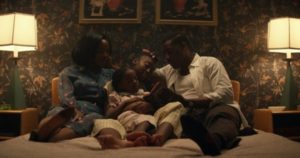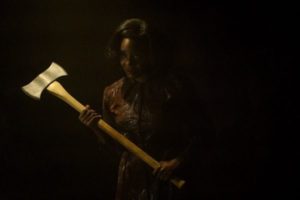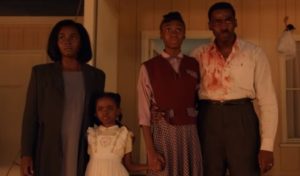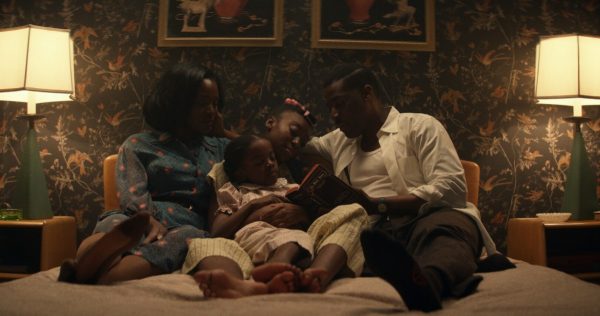
This is a savage piece of television. It pulls no punches, spares no horses and is relentlessly unsettling without resorting to cliché. Showrunner Little Marvin seems intent on making audiences squirm. By putting them in the shoes of marginalised minorities, such as the Emory family, this series forces viewers to confront their own prejudice.
Set over ten days and split into an identical number of episodes, audiences are invited to experience life through their eyes. A husband, wife and two daughters who have relocated to East Compton from North Carolina under a government incentive scheme. Based on an event known as the great migration, which happened from 1916 to 1970, this opening season addresses the reaction of white people to their arrival.

What starts out as an examination of racial attitudes in the 1950s, is soon turned inside out by some intentionally stylised choices. Cinematic split screen, a grainy Seventies aesthetic and an impressive use of Hitchcockian soundtrack choices change the playing field. Ashley Thomas imbues Henry Emory with a dignified fortitude in the face of racial ignorance, while his back story hints at further atrocities. Deborah Ayorinde does a similar job with Livia ‘Lucky’ Emory, battling blatant segregationist tactics, alongside malevolent interlopers.
This claustrophobic dissection of human frailty turns increasingly brutal, egged on by Alison Pill’s Betty Wendell, who fans the flames of fear and ignorance. Them embraces both the slasher movie grindhouse mentality, with its abstract mix of visuals and music, before leaning more towards folk tale horror stories. Jump scares are effectively wrought, tensions balanced on a knife edge, while Them continues delving into the deeply disturbing.

From the initial trailer alone others have made comparisons to Lovecraft Country and by extension Jordan Peele’s Us. Them feels so much darker than Lovecraft Country ever did, never loosening its grip on the inhumanity which defines the perpetrators. There is no sweetening of the pill, no wriggle room when it came to letting viewers off the hook. Them grabs each one by the neck and forces them to acknowledge this dark chapter in history.
Creator Little Marvin and executive producer Lena Waithe, who wrote Queen and Slim, have offered up a horror anthology with an agenda. Comparisons with Jordan Peele were inevitable as content creators of colour are still breaking into the mainstream, but Them represents something very different. This may be an idyllic suburban neighbourhood, but it shares more in common with Alan Parker’s Mississippi Burning than some might admit.

Peer pressure induced ridicule, everyday racism and an unearned sense of entitlement all drive the point home. Gradually the misguided mob mentality begins to take hold, escalating tangible threat in line with a real feeling of gnawing fear. Them is designed to raise the heckles on your neck, make you angry in the face of blind ignorance and re-evaluate points of view. It should raise uncomfortable questions, insight a desire for progress and open audiences up to the idea of cultural change. Something which makes this series significant for the progress it represents, as much as anything the creators are trying to say on screen.
Them launches on April 9th on Amazon Prime Video.



